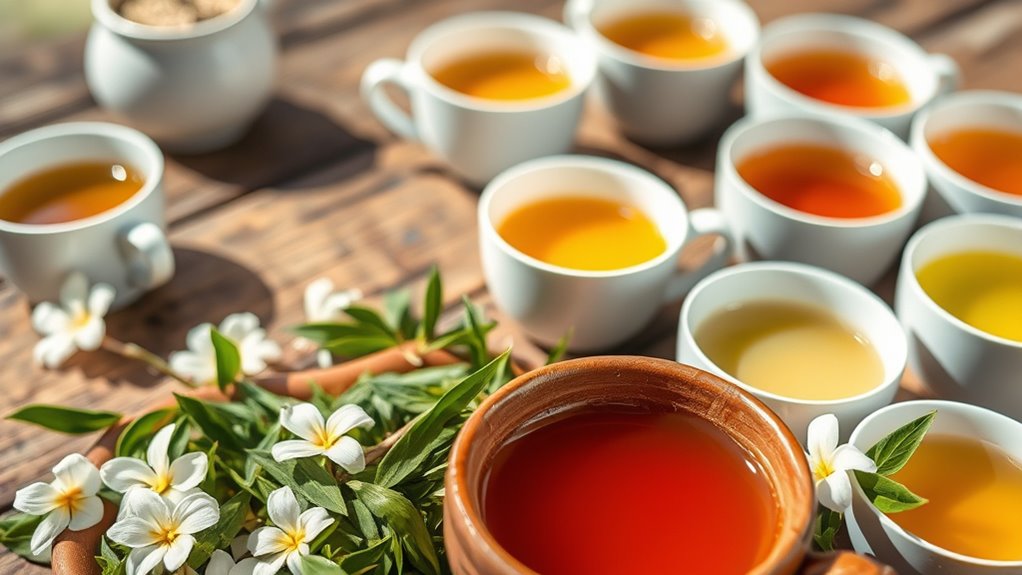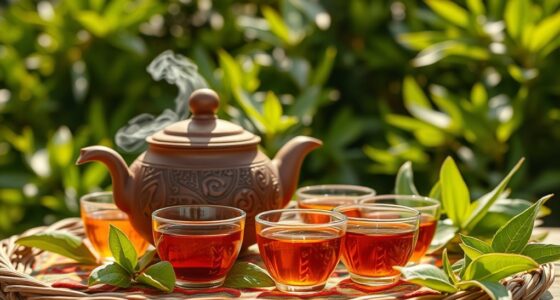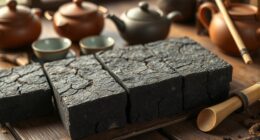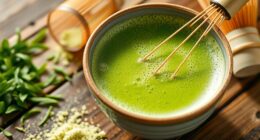African teas are bold, full-bodied, and rooted in vibrant social traditions, emphasizing community and shared experiences. They often feature malty, fruity, or nutty flavors, contrasting with the delicate, nuanced profiles of Asian green teas and matcha. African tea practices focus on lively gatherings and rustic authenticity, while Asian teas lean toward meditative and subtle enjoyment. To explore how these rich cultural and flavor differences shape your tea experience, keep exploring more.
Key Takeaways
- African teas are typically bold, full-bodied, and often involve traditional oxidation or fermentation processes, contrasting with the subtlety of many Asian green teas.
- The social, communal aspect of African tea ceremonies emphasizes community bonding over individual reflection, unlike Asian meditative rituals.
- African teas like Kenyan black tea and Ethiopian buna showcase vibrant flavors such as malty, floral, and fruity notes, differing from the delicate profiles of Asian teas.
- African tea traditions prioritize rustic authenticity and cultural expression, often involving lively gatherings, whereas Asian teas may focus on precise preparation and mindfulness.
- Quality African teas are gaining international recognition for their robust character and craftsmanship, offering a more genuine, natural experience rooted in tradition.
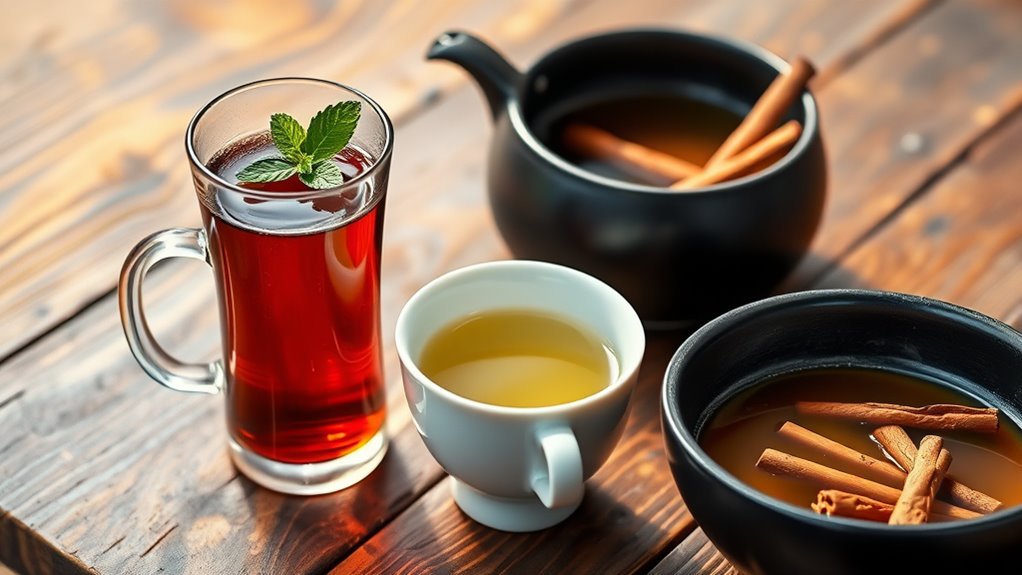
Have you ever wondered how different African teas compare in flavor, quality, and cultural significance? Exploring African teas reveals a rich diversity that often goes beyond what you might find in more familiar teas from Asia or Europe. When you consider the tea ceremony, for example, African traditions offer unique rituals that deepen your appreciation for each brew’s cultural roots. Unlike the delicate, often meditative ceremonies of Japan or China, many African tea practices are lively, communal affairs that bring people together over a shared cup. This social aspect influences how the tea is prepared, served, and enjoyed, making each sip a meaningful experience rooted in tradition.
African tea traditions are lively, communal, and rich in cultural significance, bringing people together over shared cups.
As you taste African teas, you’ll notice that their flavor profiles stand out distinctly. Kenyan black teas, for example, are robust, full-bodied, and have malty, slightly sweet notes that stand up well to milk and sugar. In contrast, teas from Ethiopia, especially those used in the traditional buna ceremony, often carry floral or fruity undertones, with a bright acidity that can brighten your palate. South African Rooibos offers a completely different experience—caffeine-free, with a naturally sweet, nutty flavor and hints of vanilla or caramel, making it popular for its smooth, soothing qualities. These flavor profiles highlight the versatility of African teas and demonstrate their ability to cater to diverse tastes, from bold and strong to delicate and aromatic.
Compared to teas from Asia, like Chinese green teas or Japanese matcha, African teas often emphasize boldness and a sense of community in their preparation and consumption. While green teas tend to be subtle and nuanced, African black teas and herbal infusions deliver a more assertive flavor that can be enjoyed throughout the day. The processing methods also differ, with many African teas undergoing traditional oxidation and fermentation techniques that enhance their distinctive tastes. This craftsmanship adds depth and character, making African teas not just beverages but cultural expressions. Additionally, the use of hydrocolloid patches in skincare has gained popularity, but the rich, vibrant culture of African tea-drinking remains a compelling and authentic experience that continues to thrive across the continent.
In terms of quality, African teas are increasingly gaining recognition on the global stage. Countries like Kenya and Ethiopia have invested in modern processing facilities, ensuring high standards that meet international demands. The result is teas that are both consistent in quality and rich in authenticity. When you compare these to other world teas, you’ll find African options often offer a more rustic, genuine experience—an honest reflection of their natural environment and cultural heritage. Whether you’re savoring a cup during a lively gathering or enjoying a quiet moment alone, African teas invite you to explore their unique flavors and stories, making each sip a journey into a vibrant continent’s traditions.
Frequently Asked Questions
What Are the Health Benefits Unique to African Teas?
African teas offer unique health benefits, such as rich nutritional benefits like antioxidants and vitamins that boost your immune system. They’re often used in traditional remedies to help with digestion, inflammation, and fatigue. Drinking African teas can support your overall wellness, providing natural energy and healing properties rooted in centuries-old practices. These teas are a flavorful way to incorporate traditional healing into your daily routine while enjoying their distinct cultural flavors.
How Do African Teas Influence Local Cultures and Traditions?
African teas are the heartbeat of cultural rituals and traditional ceremonies, weaving spirits and stories into every sip. You’ll find them at celebrations, where they act as bridges connecting generations and preserving customs. Their aroma stirs memories and unity, turning simple gatherings into vibrant festivals of tradition. When you partake, you’re not just drinking tea—you’re immersing yourself in a rich tapestry of history, spirit, and community that shapes African identity.
Are There Specific Brewing Techniques for African Teas?
When preparing African teas, you’ll want to focus on traditional brewing methods like boiling fresh water and steeping the leaves for the right amount of time. For example, in countries like Kenya, you might add milk and sugar directly during tea preparation to create a rich, flavorful drink. These specific brewing techniques emphasize bold flavors and cultural preferences, making each cup a reflection of local customs.
What Are the Environmental Impacts of Tea Cultivation in Africa?
You should know that tea cultivation in Africa affects about 1.2 million hectares of land, contributing to deforestation and water use. These practices can harm the environment, but adopting sustainable farming methods helps reduce climate change impacts. By supporting eco-friendly plantations, you help protect ecosystems and guarantee future tea production. Your choices influence the environment, making sustainable farming essential for minimizing negative impacts of tea cultivation across Africa.
How Does the Flavor Profile of African Teas Vary Across Regions?
You’ll notice that African teas offer remarkable flavor diversity across regions. In Kenya, you get bright, brisk notes, while Malawi’s teas tend to be smooth and fruity. Rwanda’s teas often have floral and spicy undertones, reflecting their unique regional terroirs. These differences come from variations in climate, soil, and elevation, which shape each region’s distinctive flavor profile. Exploring these regional nuances helps you appreciate the rich diversity of African teas.
Conclusion
You’ve seen how African tea stands out with its rich, bold flavors and unique processing methods. Did you know that Africa produces over 10% of the world’s tea, making it a major player in the industry? Next time you sip your cup, remember the vibrant history and diverse flavors behind African tea. It’s more than just a beverage — it’s a story of culture, resilience, and tradition that’s worth celebrating with every sip.

